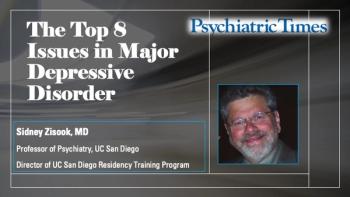
Far less attention is paid by mental health clinicians to aspects of death and dying. This Psychiatric Times Death and Dying Special Report helps fill some of that gap.

Far less attention is paid by mental health clinicians to aspects of death and dying. This Psychiatric Times Death and Dying Special Report helps fill some of that gap.

Although the practice of medicine can be immensely rewarding, it also can be extraordinarily stressful. Here's how we can help prevent clinician suicide.

What are the biggest challenges facing both clinicians and patients, and how can we address them?

A psychiatrist lists the top 8 most pressing issues in MDD, from training to accessibility.

Sidney Zisook, MD, lists these as the top 8 issues in MDD.

How can clinicians distinguish between ordinary grief, depression, and prolonged grief disorder?

Clearly, we all share the goals of respecting-not “medicalizing”-ordinary grief; as well as recognizing and treating clinically significant depression. We differ with Dr Frances in how to achieve these goals, while remaining faithful to the best available scientific data.

The recently posted draft of DSM5 makes a seemingly small suggestion that would profoundly affect how grief is handled by psychiatry.

“The exclusion of symptoms judged better accounted for by Bereavement is removed because evidence does not support separation [or] loss of loved one from other stressors.”1

We are growing older. In ancient Greece, the expected life span was 20 years. In Medieval Europe, it went up to 30 years. In 1900, people reasonably could expect to live to the ripe old age of 47 years, and 39% of those born at that time survived to age 65 years in the United States. Currently, the average life span in the United States is 78 years, and 86% of those born will survive to age 65 years. The very old-people older than 85 years-are the fastest-growing population group in the country, and there are 120,000 Americans over the age of 100 years. And the trend continues.

Everyone would probably agree that the practice of clinical psychiatry has changed profoundly over the second half of the past century. One of the most remarkable changes has been the rapid development and expansion of clinical psychopharmacology, which has become, like it or not, a dominant part of the clinical practice of most psychiatrists. Available treatments for mental disorders changed and our armamentarium broadened. We have numerous medications for psychiatric disorders. We even use medications for disorders traditionally considered only amenable to and suitable for psychotherapy.

Published: September 17th 2024 | Updated:

Published: April 21st 2022 | Updated:

Published: July 2nd 2008 | Updated:

Published: February 17th 2010 | Updated:

Published: May 13th 2010 | Updated:

Published: September 28th 2010 | Updated: